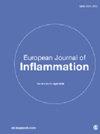Gastroesophageal reflux disease and idiopathic pulmonary fibrosis risk: A mendelian randomization study
IF 0.8
4区 医学
引用次数: 0
Abstract
Background: Idiopathic pulmonary fibrosis (IPF) is a progressive interstitial lung disease with unknown etiology and treatment options for it were limited. Whether Gastroesophageal reflux disease (GERD) could affect the occurrence of IPF remains unclear.Methods: Using available data from FINNGEN and IEU OpenGWAS, we performed Two-sample mendelian randomization (MR) to explore the causal relationship between GERD and IPF.Results: Using 65 GERD-related SNPs, we found the association between GERD and the risk of IPF was not statistically significant with IVW approach (OR = 1.20, 95% CI = 0.84-1.70, p = .32), MR-Egger regression (OR = 1.65, 95% CI = 0.19-14.43, p = .65) and weighted median approaches (OR = 1.44, 95% CI = 0.94-2.23, p = .09). However, heterogeneity was observed with MR-Egger ( p = .001) and IVW ( p = .001) analysis. Similar results were obtained with MR-PRESSO (global heterogeneity test p value <.01). After removing one outlier (rs9636202), with weighted median method, we found GERD increased the risk of IPF (OR 1.55, 95% CI: 1.01-2.36, p = .045) while not with the IVW (OR: 1.27, 95% CI: 0.91-1.78, p = .16) and MR-Egger method (OR: 2.01, 95% CI: 0.26-15.8, p = .51). Hence, we set a stricter instrument p value threshold to a level of <1 × 10胃食管反流病与特发性肺纤维化风险:泯灭随机研究
背景:特发性肺纤维化(IPF)是一种进展性间质性肺病,病因不明,治疗方案有限。胃食管反流病(GERD)是否会影响 IPF 的发生仍不清楚:利用 FINNGEN 和 IEU OpenGWAS 的现有数据,我们采用双样本泯灭随机法(MR)探讨了胃食管反流病与 IPF 之间的因果关系:使用 65 个胃食管反流相关 SNPs,我们发现胃食管反流与 IPF 风险之间的关系在 IVW 方法(OR = 1.20,95% CI = 0.84-1.70,p = .32)、MR-Egger 回归(OR = 1.65,95% CI = 0.19-14.43,p = .65)和加权中位数方法(OR = 1.44,95% CI = 0.94-2.23,p = .09)下均无统计学意义。然而,MR-Egger(P = .001)和 IVW(P = .001)分析也发现了异质性。MR-PRESSO 也得到了类似的结果(总体异质性检验 p 值 <.01)。剔除一个离群值(rs9636202)后,采用加权中值法,我们发现胃食管反流病增加了患 IPF 的风险(OR 1.55,95% CI:1.01-2.36,p = .045),而 IVW 法(OR:1.27,95% CI:0.91-1.78,p = .16)和 MR-Egger 法(OR:2.01,95% CI:0.26-15.8,p = .51)则没有增加患 IPF 的风险。因此,我们设置了更严格的仪器 p 值阈值,即 1 × 10-8,MR 估计值没有统计学意义。此外,也没有观察到方向性多效应(截距 = -0.01;SE = 0.036;P = .772)。为了验证胃食管反流病对 IPF 的因果效应,我们从另一个 GWAS 数据中发现了三个 SNPs(rs79348626、rs12759463 和 rs4269485)与胃食管反流病有显著的独立相关性。使用 IVW 法(OR = 0.91,95% CI = 0.42-1.97,p = .814)、MR-Egger 回归法(OR = 0.43,95% CI = 0.06-3.07,p = .553)和加权中位法(OR = 0.90,95% CI = 0.36-2.27,p = 0 0.819)进行的分析表明,没有证据表明胃食管反流病与 IPF 之间存在因果关系:我们使用 MR 进行的分析不支持胃食管反流病可显著增加 IPF 的发病率,这表明治疗胃食管反流病不能降低 IPF 的发病风险。
本文章由计算机程序翻译,如有差异,请以英文原文为准。
求助全文
约1分钟内获得全文
求助全文
来源期刊

European Journal of Inflammation
Medicine-Immunology and Allergy
自引率
0.00%
发文量
54
期刊介绍:
European Journal of Inflammation is a multidisciplinary, peer-reviewed, open access journal covering a wide range of topics in inflammation, including immunology, pathology, pharmacology and related general experimental and clinical research.
 求助内容:
求助内容: 应助结果提醒方式:
应助结果提醒方式:


